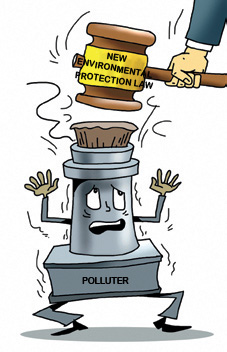|
 |
|
(XINHUA) | The effects
"The revised law has largely increased the penalties for polluting the environment," said Wang Canfa, a law professor at China University of Political Science and Law in Beijing. "In the past, the fine was too small to deter companies or individuals. They almost ignored it."
Wang made a research in Chongqing after the enforcement of the revised law. The result showed that after fines are calculated on a daily basis, 84 percent of the companies said that they would suspend operations that could harm the environment, while in the past, only 4.8 percent would.
Responsible local officials, as well, will face legal punishments for the concealment of offenses, falsifying data, failing to publicize environmental data, and not giving closure orders to enterprises that illegally discharge pollutants.
"Lax supervision is to blame for this heavy pollution," said Wang Xiaojun, a professor at the College of Environment and Energy at South China University of Technology.
"Some small company heads assume their dirty secrets will not be discovered, while some bigger companies have 'shelters' behind them," Wang Xiaojian said, explaining that these "shelters" were basically local officials that relied on the taxes paid by polluting companies.
Wang Canfa said that local environmental officials were usually caught between a rock and a hard place: between government heads and polluters.
"One the one hand, they need to stop pollution, on the other, government heads usually ask them to be tolerant of big polluters who pay sizable taxes," Wang Canfa said.
Luo Hui, head of the Environmental Protection Bureau of Bama County, a famous "land of longevity" known for its breath-taking natural environment in south China's Guangxi Zhuang Autonomous Region, complained that environmental watchdogs are particularly understaffed at the county level, which impacted the effectiveness of supervision work.
"In Bama, we have hundreds of thousands of tourists every year, putting huge environmental pressure on us, but our bureau only has seven employees," Luo said.
To tackle the problem, the government should allow broader public oversight and encourage them to report pollution scandals, said Luo Guo'an, a research fellow with the Guangxi Academy of Social Sciences.
"Environmental protection is one of China's basic state policies and the country's current state of affairs from an environmental standpoint is still rather grim," said Zhou Ke, a law professor at Beijing-based Renmin University of China. "The implementation of the revised law is a major component in the country's eco-friendly development and construction framework."
"The revised law states individuals in society all have the right and responsibility to monitor environmental situation," said Zhou. "This is a big leap forward and will also encourage NGOs to participate."
Email us at: yuanyuan@bjreview.com | 